Federal funds approved to repair Seacoast storm damage and improve climate resilience
- Oops!Something went wrong.Please try again later.
- Oops!Something went wrong.Please try again later.
RYE — Beside the shores of Rye Harbor, pummeled in January by coastal storms, local, state and federal officials gathered Monday to discuss the future resiliency of the Route 1A corridor with help from a $20.2 million federal grant.
Earlier in the day Gov. Chris Sununu announced President Biden had approved more than $3 million in federal FEMA funds to help repair some of the damage from the January storms in Rockingham and Grafton counties.
The Federal Highway Administration PROTECT grant is allocated directly to the state Department of Transportation. The grant will shore up seawalls along a three-mile stretch between North Hampton and Rye, two local communities battered by the back-to-back January coastal storms and flooding events that resulted in widespread damage to public and personal property.
By securing public infrastructure, the state’s goal is to reduce the impact of future storms and floods that strike the Seacoast and minimize travel disturbances.
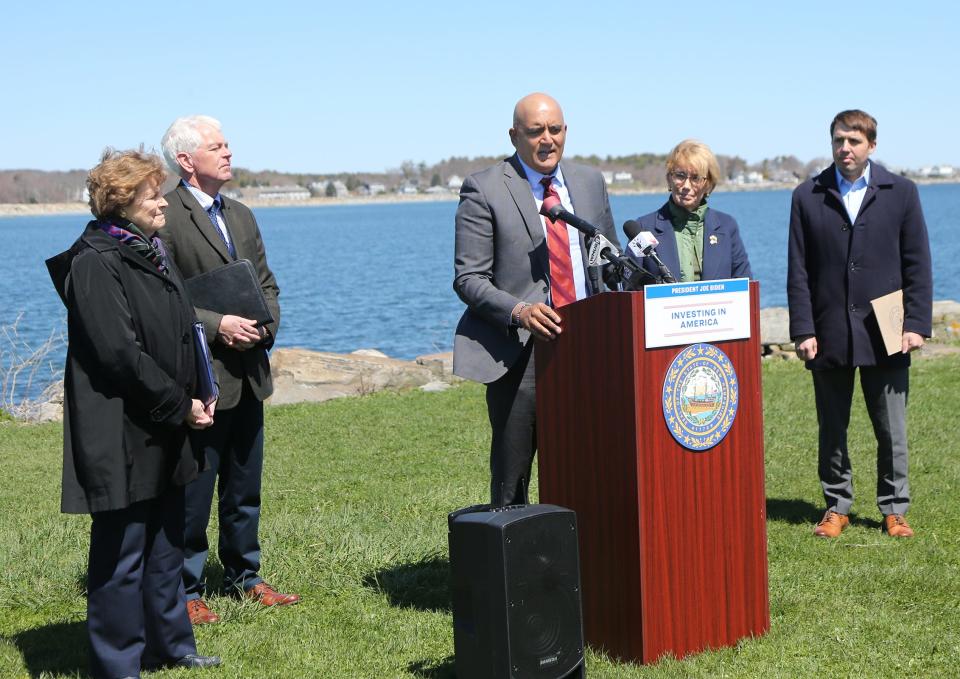
Shailen Bhatt, administrator of the Federal Highway Administration, was joined by New Hampshire's two Democratic U.S. Senators Maggie Hassan and Jeanne Shaheen, Democratic U.S. Rep. Chris Pappas, and area municipal officials for an Earth Day event hailing the grant award. The $20,258,400 grant for reconstruction efforts in the Seacoast is part of the Federal Highway Administration’s $829.6 million earmarking for 80 projects throughout 37 states, the District of Columbia and the U.S. Virgin Islands.
“What is very clear is after more and more of the storms that are coming in that protection that was great for decades, is not standing up to the 21st-century climate, which I think is emblematic of our infrastructure system,” Bhatt said at a press conference in Rye Harbor State Park Monday. “The system that was designed in the 20th century isn't able to handle the precipitation rates and the storm rates that we're seeing on an increasing basis. Whether it's New Hampshire, Texas, Georgia, fires in Hawaii (or) flooding in Tennessee, we're just seeing more and more of these climate-related events.”
Work on the project will be completed through five construction contracts, according to the New Hampshire Department of Transportation. Fourteen revetment stone barriers and sea walls will be tended to over a multi-year period.
As part of the project, one of the first priorities is reconstructing revetment sections between the North Hampton and Rye town line near Fox Hill Point and Rye Ledge, a roughly 0.6-mile span.
A New Hampshire Department of Transportation narrative of the project from August notes that $20 million in aid would cover about 80% of the estimated construction costs for the project.
More: Rye, North Hampton to get $20M in federal funds to repair Route 1A coastal flood damage
Bhatt stated that design work for the project is roughly 30% complete and that the New Hampshire Department of Transportation is about two years away from beginning any construction.
Construction could take upwards of two years, he added.
“I think climate change was something that a lot of people had some debates about for a long time,” Bhatt said. “I think that if you live along the coastline, there's no longer a debate that the ocean is behaving in ways that it just hasn't (before) … There are still some people who want to debate the causes, but when it comes to our infrastructure, I think Americans, regardless of their political affiliation, recognize that something must be done.”
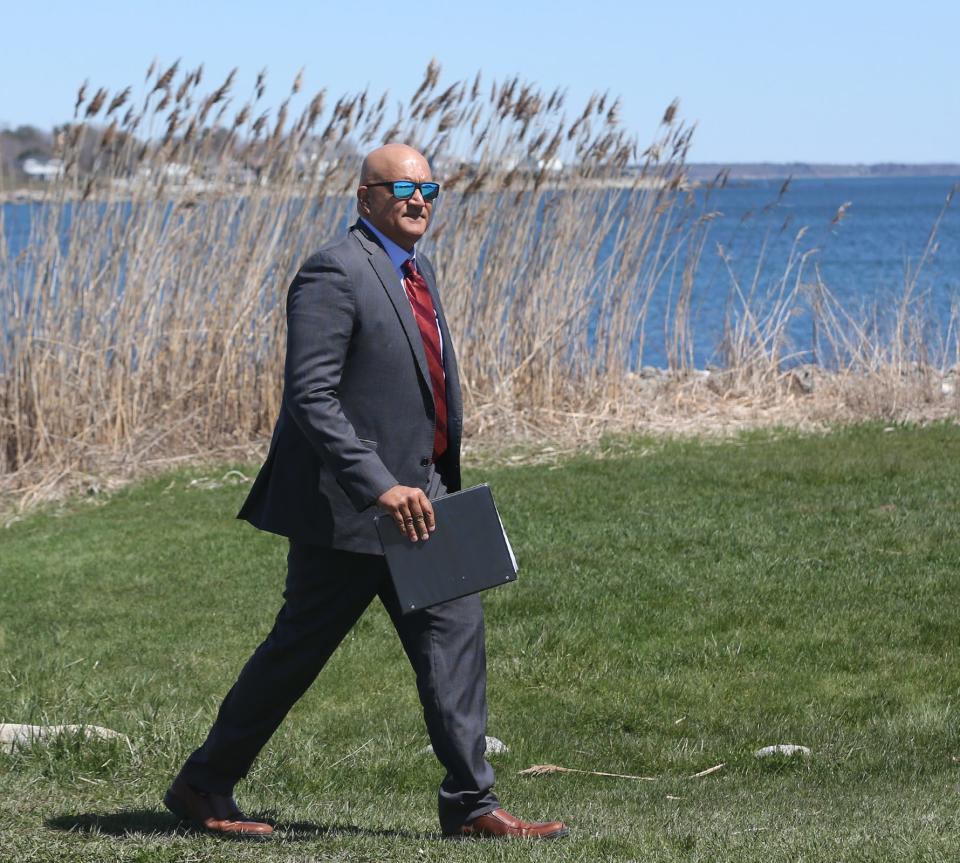
New Hampshire Department of Transportation Commissioner Bill Cass told the crowd the Route 1A resilience project dates back to several storms in early 2018 that weakened local public infrastructure, similar to storms at the start of this year.
The commissioner added the Seacoast project will likely be conducted in three phases.
“We want to rebuild these revetments and stone walls back, so they’ll be able to withstand those storms and hopefully recover quicker,” Cass said.
“Our coastal seawalls play a pivotal role in safeguarding critical state and local infrastructure, necessitating substantial post-storm cleanup and repair efforts after each coastal storm or flooding event,” added Rye Town Administrator Matthew Scruton. “The vulnerability of Route 1A, a vital artery for both local and regional transportation, looms large with each storm or flooding occurrence. This project will reconstruct the seawalls and coastal erosion protections, substantially improving our coastal resilience.”
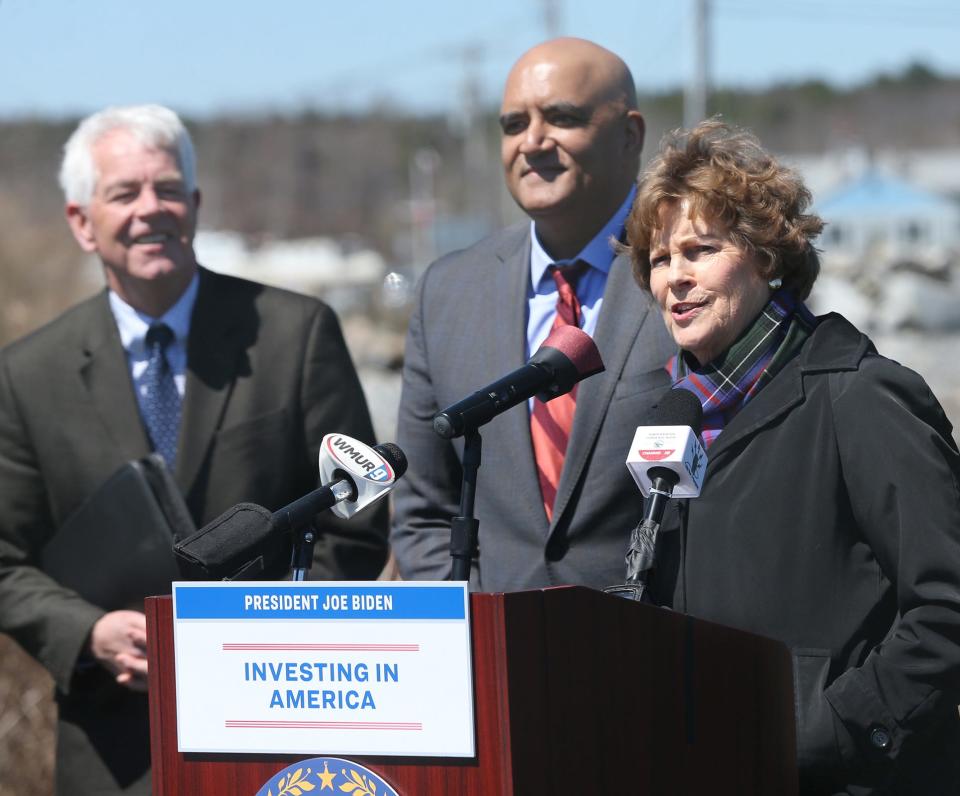
The coastal resiliency grant award comes as local officials throughout Rockingham County are set to receive a separate batch of money after New Hampshire’s disaster declaration for the January storms and flooding was approved.
Though distinct from each other, the PROTECT grant and the future Federal Emergency Management Agency (FEMA) funding will complement each other, according to Rye public works director Jason Rucker. Revetments and roadways in Rye suffered major damage during the January storms, and Rye officials estimate roughly $500,000 worth of damage was incurred across the two events.
“The FEMA money will go to repair in kind the damages that were done in January, and the PROTECT grant will go to infrastructure improvements for the revetments,” Rucker said Monday.
“They’re trying to shore that up and come up with something more robust temporarily to try and get us through the summer season,” Rye Police Department Chief Kevin Walsh said of the recent storm damage.
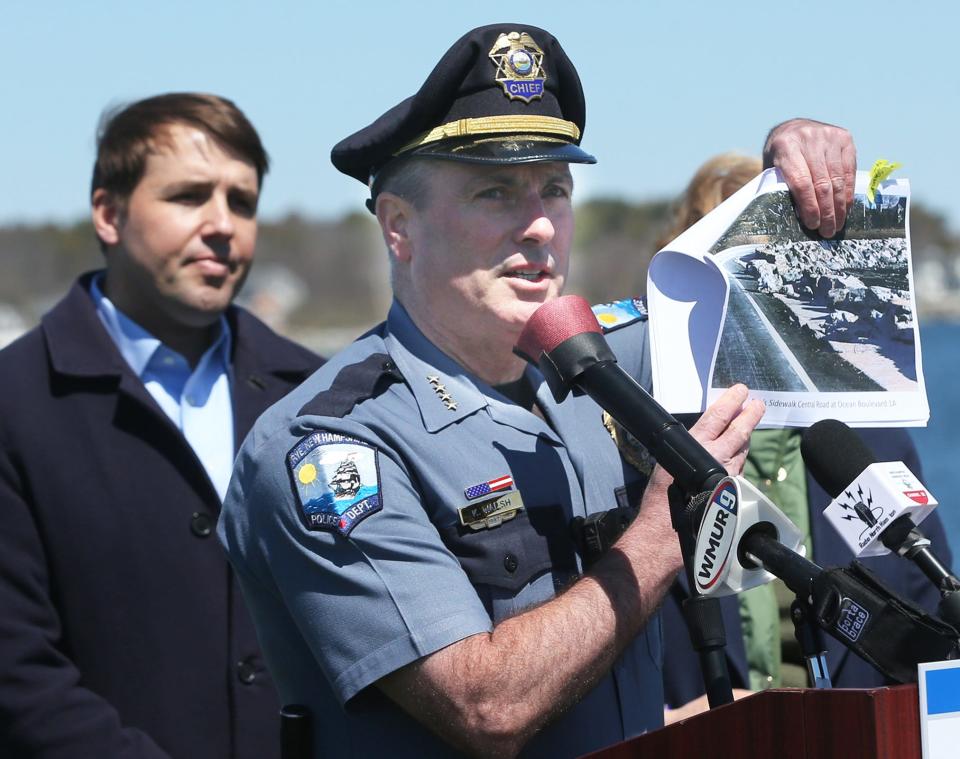
Members of New Hampshire’s congressional delegation spoke to the importance of rebuilding for the future rather than only addressing current needs and damage.
“These storms are getting more and more severe,” Pappas said. “We’re seeing the impacts on our built infrastructure, on properties up and down the Seacoast of New Hampshire. We can’t just be satisfied with the fact that we might repair the damage as the infrastructure used to exist and feel like we’re prepared for the future. That’s not a recipe for success. We have to be building for the future.”
Hassan touted the Earth Day event as proof of how government responds to the needs of citizens and communities.
“It’s a reminder of how important the advocacy of Granite Staters and people all across the country have been in ensuring that we preserve our communities and our planet for future generations so that they can enjoy the natural beauty that New Hampshire has to offer, and our way of life,” she said.
Hampton Beach cleanup: NH DOT says sidewalks, roads will be ready by Memorial Day
Seacoast to receive $3M in FEMA funds to repair January storm damage
Seacoast communities in Rockingham County will receive federal disaster assistance to aid in the cleanup from the January storms that caused over $3 million in assessed public damages statewide.
President Joe Biden approved the state’s request for funding on Friday, a move announced by the White House that day.
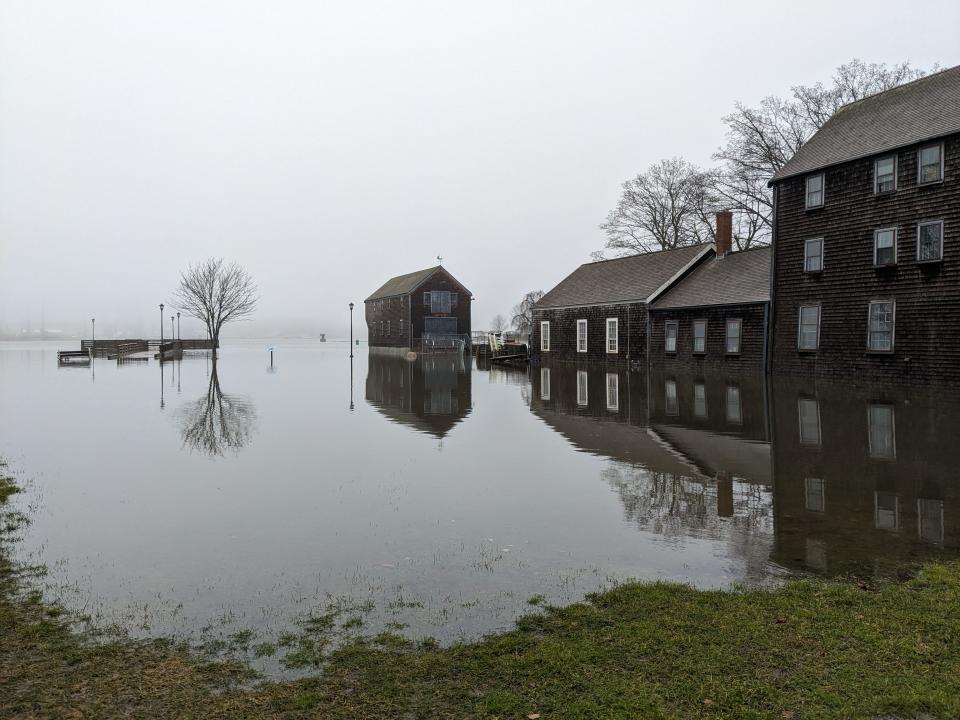
Gov. Chris Sununu lauded the funding allocation on Monday. Despite asking for disaster funding for four New Hampshire counties, only Rockingham and Grafton counties were included in the declaration.
“Communities along the Seacoast saw unprecedented flooding from this severe storm and astronomical high tide,” Sununu said in a prepared statement. “In addition, Grafton Country experienced significant power outages from downed trees and limbs. This disaster declaration provides the opportunity for communities to recuperate costs incurred while fixing damages. The state will continue to work with officials in both counties to utilize relief funding to make the communities whole again.”
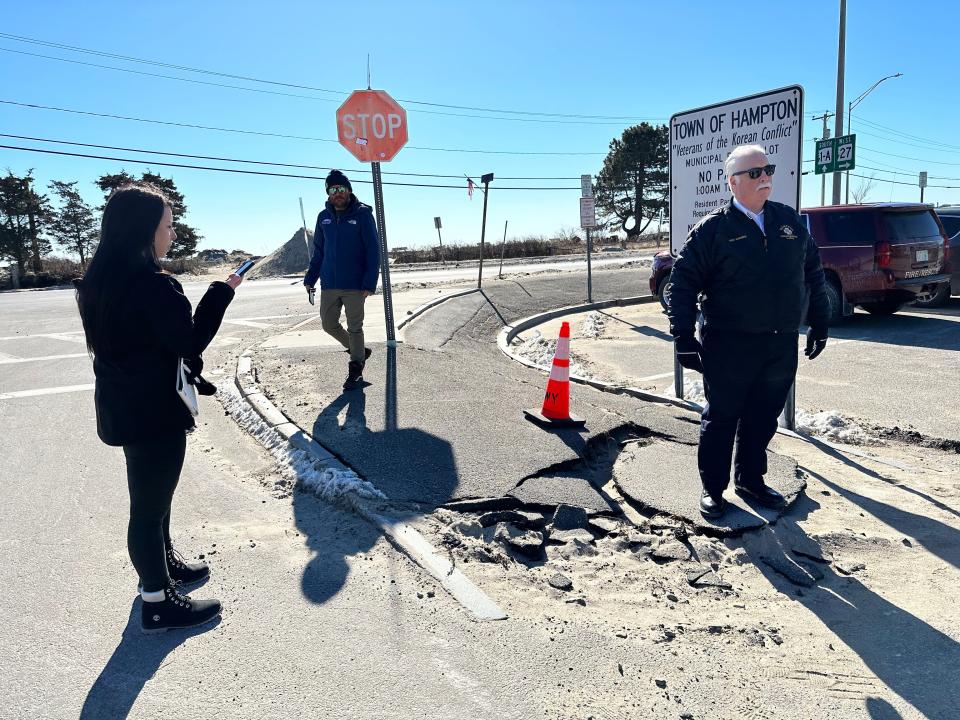
Sununu submitted the state’s disaster funding request in late March, seeking federal relief for Coos, Grafton, Rockingham and Sullivan counties. Local and state officials partnered with the Federal Emergency Management Agency to conduct a preliminary damage assessment, which found that the public storm damage throughout New Hampshire between Jan. 9 and Jan. 14 cost $3,004,838.
More: NH requests $3M in federal disaster funds for January storms damage
The state's request did not account for damage to private property or businesses in New Hampshire.
The governor called for a statewide designation of the Federal Emergency Management Agency’s Hazard Mitigation Grant Program, which gives money to municipalities to help their communities rebuild and prevent future disaster losses.
With Biden’s stamp of approval on the declaration, communities within Rockingham and Grafton counties can continue the process of receiving federal aid.
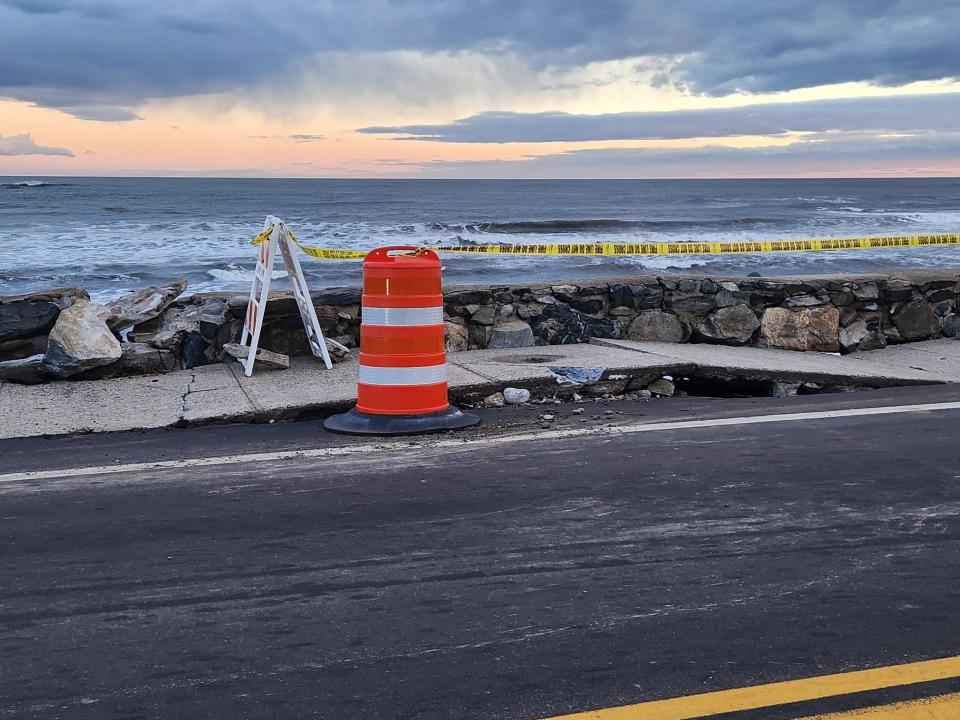
“This declaration will provide a step toward recovery in the communities that experienced severe flooding and power outages in January,” said Robert Buxton, director of the state Department of Safety’s Division of Homeland Security and Emergency Management, in his own prepared statement. “We will continue to assist communities with the process of making repairs and working on mitigation projects to prevent similar problems in the future.”
The Division of Homeland Security and Emergency Management will arrange meetings with leaders in the affected communities throughout the two counties to explain the federal funding application process, per Sununu’s announcement.
Agencies that are eligible for receiving assistance include local, county and state agencies as well as nonprofits that provide critical services, the state noted.
This article originally appeared on Portsmouth Herald: Federal funds approved to fix Seacoast storm damage, boost resilience

